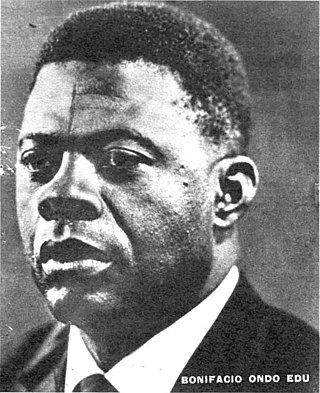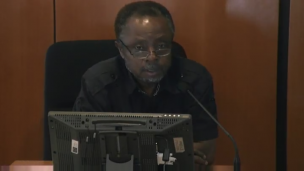Related Research Articles

Equatorial Guinea, officially the Republic of Equatorial Guinea, is a country on the west coast of Central Africa, with an area of 28,000 square kilometres (11,000 sq mi). Formerly the colony of Spanish Guinea, its post-independence name refers to its location near both the Equator and in the African region of Guinea. As of 2021, the country had a population of 1,468,777, over 85% of whom are members of the Fang people, the country's dominant ethnic group. The Bubi people, indigenous to Bioko, are the second largest group at approximately 6.5% of the population.

The History of Equatorial Guinea is marked by centuries of colonial domination by the Portuguese, British and Spanish colonial empires, and by the local kingdoms.

Malabo is the capital of Equatorial Guinea and the province of Bioko Norte. It is located on the north coast of the island of Bioko. In 2018, the city had a population of approximately 297,000 inhabitants.

Francisco Macías Nguema, often mononymously referred to as Macías, was an Equatoguinean politician who served as the first President of Equatorial Guinea from the country's independence in 1968 until his overthrow in 1979. He is widely remembered as one of the most brutal dictators in history.

María Pilar Nsue Angüe Osa was a noted Equatoguinean writer and Minister of Education and Culture.

Spanish Guinea was a set of insular and continental territories controlled by Spain from 1778 in the Gulf of Guinea and on the Bight of Bonny, in Central Africa. It gained independence in 1968 as Equatorial Guinea.

Bonifacio Ondó Edú-Aguong was an Equatoguinean politician who served as the Prime Minister of Equatorial Guinea from 1964 to 1968 while it was still under Spanish colonial rule, as Spanish Guinea. He played a leading role in the country's independence, and led the National Union Movement of Equatorial Guinea from 1959 until his death.
The Lengue language, also called Molengue, Balengue, Molendji, is a Bantu language of southern Equatorial Guinea, spoken by the Lengue people between Bata and the Gabon border near the coast. The speakers have come under increasing Fang influence. The Ethnologue describes it as a member of the B subgroup of Northwest Bantu, while Echegaray is more specific, saying that it is linguistically a member of the Sheke group :

Equatorial Guinea was the only Spanish colony in Sub-Saharan Africa. During its colonial history between 1778 and 1968, it developed a tradition of literature in Spanish, unique among the countries in Africa, that persists until the present day.

Atanasio Ndongo Miyone was an Equatoguinean musician, writer and Fang political figure. He wrote the lyrics to Equatorial Guinea's national anthem, Caminemos pisando las sendas de nuestra inmensa felicidad. He was executed in 1969 following a failed coup to depose Francisco Macías Nguema, the first ruler of an independent Equatorial Guinea.

Justo Bolekia Boleká is an Equatorial Guinean scholar and writer of Bubi descent.

General elections were held in Spanish Guinea on 22 September 1968 to elect a President and National Assembly that would lead the country when it gained independence as Equatorial Guinea later that year. A second round of the presidential election was held on 29 September.

The Ministry of Foreign Affairs, International Cooperation, and Francophone Affairs is a ministry of the Government of Equatorial Guinea. The current minister is Simeón Oyono Esono Angue, appointed in 2018.
Federico Ondo Obama Ondo, also known as Fede, is an Equatorial Guinean professional footballer who plays as a fullback for Andorran Primera Divisió club Penya Encarnada d'Andorra. He capped for the Equatorial Guinea national team. He also holds Spanish citizenship.
Ángel Masié Ntutumu was an Equatorial Guinean politician.
Regina Mañe Ela was an Equatorial Guinean politician and opposition campaigner.
Salvador Elá Nseng Abegue was an Equatorial Guinean military leader, politician, and diplomat.

The Popular Idea of Equatorial Guinea was a nationalist political group created at the end of the 1950s with the goal of establishing independence in Equatorial Guinea. The IPGE is considered to be the first formal Equatoguinean political party. The IPGE was founded by a group of exiles living in Gabon and Cameroon, with their official headquarters in Ambam. Early party leaders included Clemente Ateba, José Perea Epota, Antonio Eqoro, Jaime Nseng, and Enrique Nvó, who was credited for starting the IPGE during his time in exile in Ambam. Nvo's radical political ideas and his rise to power in sections of northern Rio Muni concerned Spanish authorities, who allegedly paid contract killers to assassinate him in 1959.

The United National Workers' Party was a political party in Equatorial Guinea. It was the only political party in the country from 1970 to 1979, during the dictatorship of Francisco Macías Nguema.
The Supreme Military Council — initially called the Military Revolutionary Council — was the ruling military junta and the de facto government of Equatorial Guinea between the 1979 coup d'état and the 1982 constitutional referendum.
References
- ↑ Gustau nerín. See his monography: G. NERÍN, Un guardia civil en la selva, Edit. Ariel, Barcelona, 2008.
- ↑ Index des personnalités historiques de la GUINEE EQUATORIALE
- ↑ El Gobernador Faustino Ruiz González y el nacionalismo en Guinea Ecuatorial, article by Donato Ndongo-Bidyogo, Seminario Internacional "Actores Coloniales españoles y Espacios Africanos SS. XIX-XX", Universidad de Alcalá, 2–3 December 2010
- ↑ La Guinea Ecuatorial: Reminiscencia histórica, experiencia de las luces y de las sombras de un proyecto político, artículo de Eugenio Nkogo Ondó.
- ↑ Acacio Mañé Elá, una historia por contar, Oyono Ayingono, Carmela. Editorial Trifaldi, Madrid, 2011, ISBN 978-84-938520-0-9
- ↑ "La Gaceta de Guinea Ecuatorial - 42 años de la Independencia, y de Recuerdos". Archived from the original on 2016-03-04. Retrieved 2015-07-12.